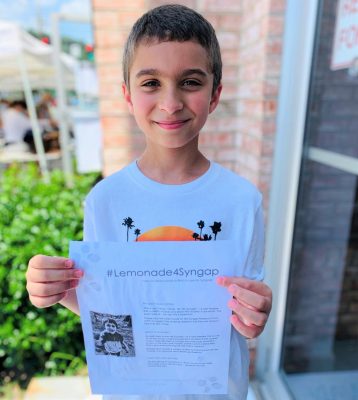Boy’s Lemonade Stand Raises Research Funds for Brother’s Rare Disorder
By Lindsay Emery

Aayan Bilal, an incoming fourth-grader at Douglas E. Grafflin Elementary School in Chappaqua, was compelled to do something to help his younger brother.
His brother, Yonas, was diagnosed at two-and-a-half years old with the rare genetic disorder SynGAP1 Syndrome that is currently known to affect only about 500 people around the world. On July 25, Aayan raised $381 by organizing a lemonade stand in downtown Chappaqua and donated the proceeds to the SynGAP1 Research Fund.
Aayan said that he wanted to help his brother and others afflicted with SynGAP1.
“I needed to do a lemonade stand because we only took donations because we needed money to pay the people to do the research for us,” Aayan said.
Caroline Bilal, Aayan and Yonas’ mother, explained that the study will search for treatments by investigating how certain types of mechanisms in the SynGAP1 gene help to regulate the gene and the SynGAP1 protein in the brain.
She explained that she had a healthy pregnancy with Yonas and his ensuing birth went well. However, doctors started noticing that Yonas, who is now eight years old, wasn’t making an effort to crawl or pull himself up at about six months old. The most glaring symptom was a lazy eye.
She remembered the ophthalmologist asking if Yonas had issues with low muscle tone. When he was taken to the pediatrician, it was pointed out that Yonas couldn’t sit independently and was slouching to one side.
“At that point he was about a year and we realized he was behind on all his other milestones too, including verbally,” she said.
The family decided to start early intervention services – physical and occupational therapy, speech therapy, feeding and other related services. Caroline said there was also a concern that Yonas was intellectually disabled. Medical professionals were hesitant to provide a clear answer on that because children develop at different rates, she said.
Yonas was diagnosed with autism at about two years old after his low muscle tone and cognitive delays continued. Services were provided for Yonas related to autism, but it never appeared sufficient.
“We noticed there was something else going on because he didn’t really fit the traditional mold of a kid on the spectrum,” Caroline said. “For example, he sought out bodily contact and affection very actively.”
At about that time, the family went to Montefiore to seek guidance from a pediatric geneticist, who formally diagnosed Yonas with hypotonia, which is low muscle tone. The geneticist had secured a grant to have a handful of children tested using Whole Exome Sequence (WES) testing, where scientists dissect small groups of chains of one’s entire exome. A year later, the geneticist concluded that Yonas had the new and very rare syndrome called SynGAP1, which was discovered in 2009.
At the age of three, Yonas developed seizures, which are now mostly controlled. He currently attends Tappan Hill School in Tarrytown, where he is in an Applied Behavior Analysis program. He has a full-time, one-to-one aide for safety because of the hypotonia and the possibility of seizures.
This summer Aayan wanted to help the scientists who are researching SynGAP1 by establishing the lemonade stand to raise money. The stand was a success thanks to Aayan’s friend Ari Perez-Hall and his family, who held signs and collected donations. Over just two hours, the stand raked in $381 worth of donations and an online GoFundMe drive has doubled Aayan’s initial goal of raising $1,000 to $2,000.
The Bilal family hopes to highlight SynGAP1 to the public because it is one of the few genetic syndromes that has been identified to cause autism. Other common symptoms include epilepsy, behavioral challenges, learning disabilities and sensory processing disorder.
“I think raising awareness is so important with this syndrome because if parents know that they have a child that is autistic and has this combination of symptoms, they could potentially test very specifically for SynGAP1,” Caroline said. “It’s very easy to just test for SynGAP1 and thus have a much better sense of how to actually prepare or plan interventions for their child.”
To learn more about SynGAP1, visit https://syngapresearchfund.org.
To donate to Aayan’s SynGAP fund, visit https://charity.gofundme.com/o/en/campaign/lemonade4syngap/carolinebilal?utm_campaign=oc&utm_medium=facebook&utm_source=crowdrise&fbclid=IwAR3_xzPNOu5bkSL8h-oorkhPYJZGWj__yal7SWY9J_mA0FKKpNqD6Cm3zj0

Examiner Media – Keeping you informed with professionally-reported local news, features, and sports coverage.
